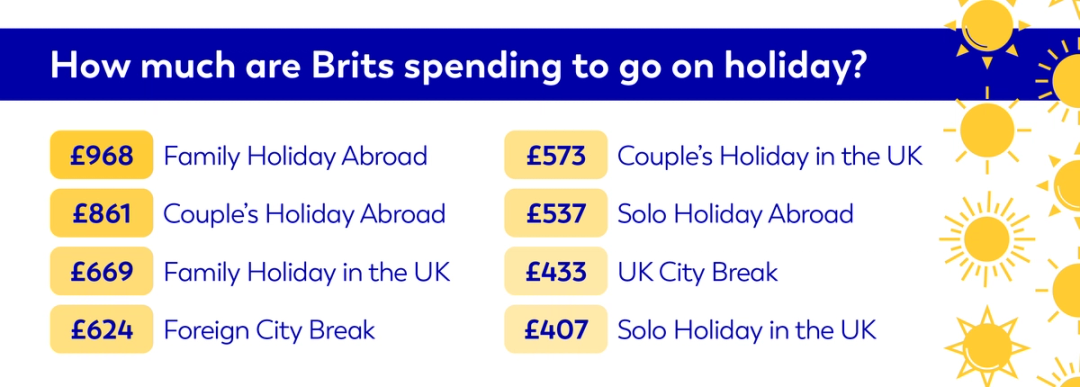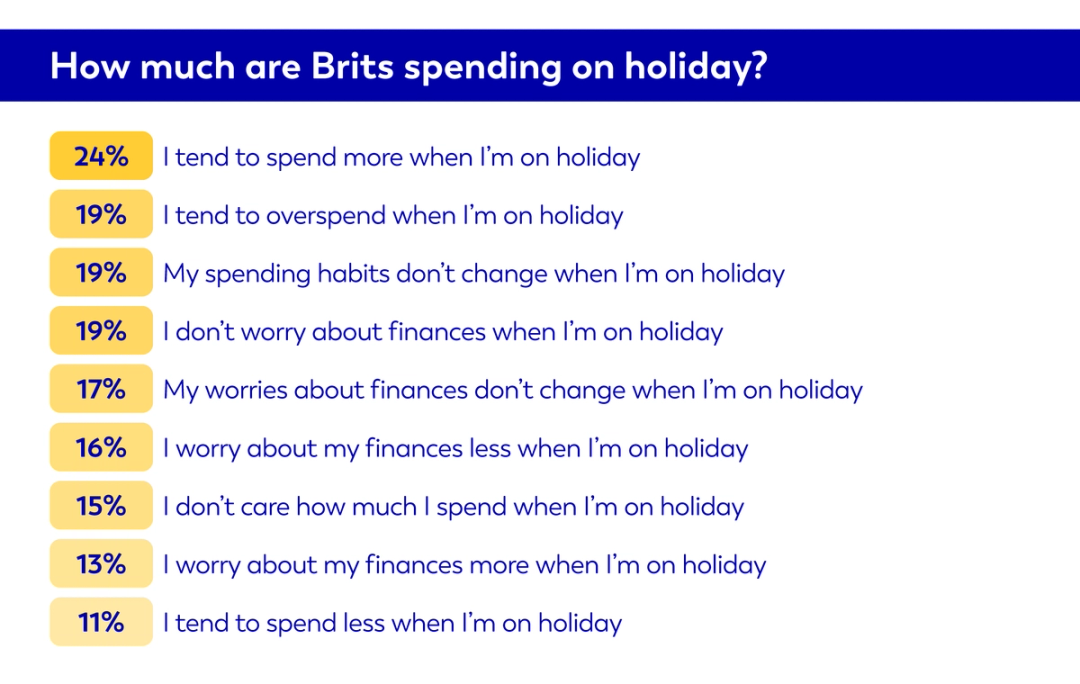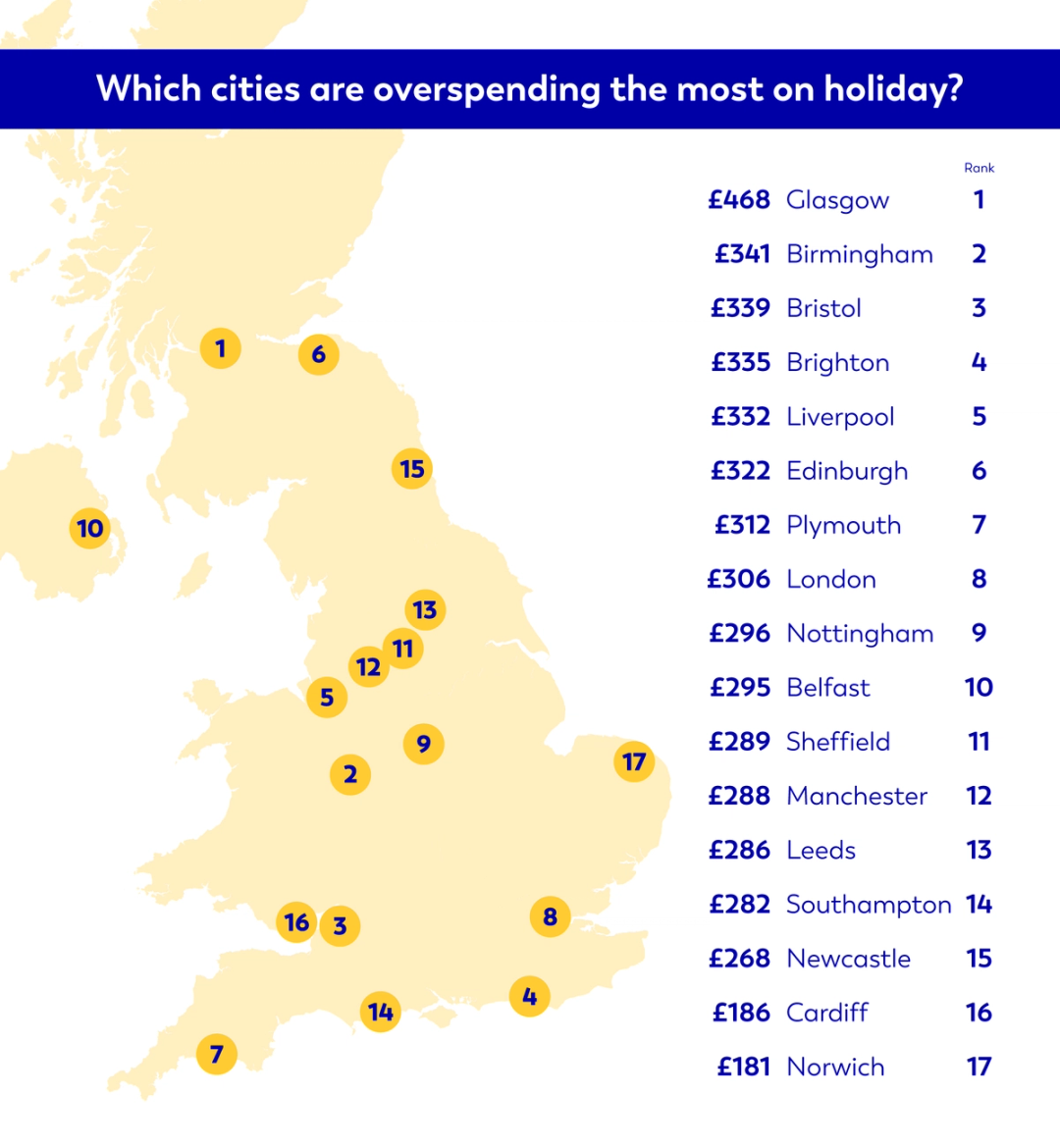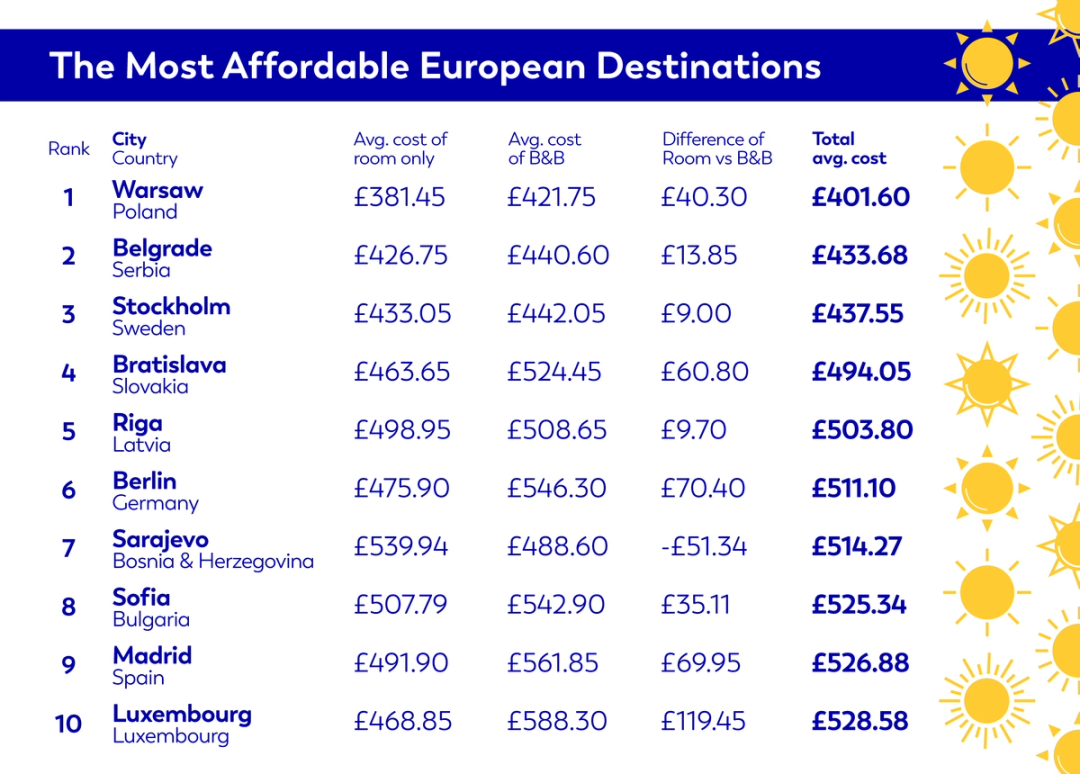In this article
- Who is spending the most and on which type of holidays?
- What are the holiday priorities of people in the UK?
- How confident do people feel about staying within their holiday budget?
- Do people’s spending habits change when on holiday?
- How much are people overspending when on holiday?
- The most affordable places to stay in Europe
- The more affordable UK staycations
Savvy holiday spending
Aqua explores the holiday spending habits of people across the UK.

Whether you want a sun-soaked beach trip or a festive Christmas city break, holidays are the perfect way to relax, unwind, and spend quality time exploring new places with loved ones. But how effective are we when it comes to holiday budgeting and spending?
We've conducted a new survey, looking at the holiday spending habits of people across the UK. The study takes into account how much people are willing to spend on different types of trips, what Brits’ priorities are when it comes to holidays, and what they may have a tendency to overspend on while away. To help people looking to plan their next trip, we’ve also looked into the best holiday destinations around the world for different budgets.
Our experts have also provided top tips for how to improve budgeting while on holiday, and have explained why credit cards could be a very useful tool for booking holidays and spending abroad, when used responsibly.
Who is spending the most and on which type of holidays?
Everyone has different budgets when it comes to holidays, and depending on their lifestyle and interests, people may prefer going on one type of holiday over another.
So, from UK stay-cations to solo trips abroad, our survey asked people across the UK how much they are willing to spend on several different types of holidays, to determine who is spending the most on which type of trip.

Family holidays abroad were found to be what Brits are willing to spend the most on, with an average potential spend of £968 total. Coming in second place, people are also open to spending a significant amount on couples’ trips abroad, with costs tending to average around £861. Perhaps surprisingly, Brits are also prepared to spend quite a bit on family holidays in the UK, with those surveyed suggesting they would spend £669, on average.
With an average spend of £1,141, those living in Southampton are willing to pay the most for family holidays abroad, compared with all other cities analysed. Southampton residents also tend to spend more than any other UK city when it comes to going on a couples’ trip abroad (£1,168) and foreign city breaks (£740).
However, with an average cost of £684, we found that Glaswegians are prepared to spend the most on taking a couples’ stay-cation in the UK. Residents in Leeds are perhaps the most adventurous when it comes to their holidays given that they are open to spend the most on solo holidays abroad, averaging around £627.
What are the holiday priorities of people in the UK?
Whether we’re after cities steeped in culture, or a 5* hotel with a pool and spa, we all have different ideas of what constitutes the perfect holiday. To see what Brits feel are the most important factors in a holiday, our research also looked into what kind of things people are prioritising when it comes to planning and booking a trip.
With one-third (32%) of Brits saying price and budget were key priorities for them, cost is one of the main things people take into consideration when booking a holiday. In joint second place, one-sixth (16%) of people say all-inclusive packages and deals are something they look for, and a further 16% say the weather conditions of a destination are an important factor when booking holidays. Closely following is safety and security, with 15% of people prioritising this when planning a trip.
Other than price, the most important parts of a holiday seem to vary significantly depending on age. Those aged between 16 and 24 value the safety and security of a destination the most, with one-sixth (17%) saying it's their main priority when booking. In comparison, those aged between 45 and 54 tend to favour good flight times, with 15% suggesting this to be the case, while the over 55s are prioritising the weather, with one-fifth (18%) saying the climate of a destination is a big deciding factor for them when planning a holiday.
How confident do people feel about staying within their holiday budget?
We know that budgeting can be a challenge for some, so we also asked respondents how confident they feel in creating, and sticking to, a budget for different aspects of their holiday.
In general, keeping costs down on meals or nights out is the trickiest part, with nearly one-third (29%) of people admitting they are not confident in creating and sticking to a budget for food and drink while on holiday.
However, it seems that financial confidence whilst on holiday differs depending on age. Those aged between 25 and 44, and the over 55s, say they are most likely to overspend on food and drink, however almost half (46%) of those aged between 16 and 24 are more worried about not being able to stick to a budget for excursions.
Men also seem to be slightly less confident when it comes to keeping costs down on excursions, with one-third (29%) admitting this is what they might struggle with the most. Women on the other hand, think they will find a food and drink budget the hardest to create and stick to, with 30% admitting they don’t feel confident in this area.
Top tips for creating and sticking to a holiday budget
While saving for a big trip can be daunting, learning how to budget makes planning a holiday much more manageable. We’ve compiled some tips to help give you the confidence to create, and stick to, a holiday budget.
1. Work out the costs of the trip
First, you need to decide where exactly it is that you want to go. Then do your research to work out the total cost of the trip, considering things like travel, accommodation, activities, eating and drinking, and any other spending money you think you might need in that specific destination.
Make sure to factor in any additional transport, such as taxis and buses, while you’re on the trip, and research into any potential taxes you might have to pay, or visas you need, to ensure you’re fully prepared before you go.
2. Use a holiday budget planner
Once you’ve worked out the cost of your trip, it’s helpful to keep track of your budget and savings. Using an app or specific holiday budget planner is a great way to keep all of this information in one place, allowing you to map out everything you plan to spend, while also giving you a view of how much you may need to save each month before your holiday.
3. Allow for flexibility
Being strict enough with your spending that you don’t run out of money halfway through your holiday, but allowing for a few treats will take away some stress from your trip. Planning before you go, and keeping some money aside for additional experiences you might want to partake in, means you won’t end up overspending, but will also be able to get the most out of your trip.
4. Utilise your credit card responsibly
A credit card could be a useful tool when planning and budgeting for a holiday. Booking flights and hotels on a credit card means you’ll be protected for purchases over £100 under Section 75 of the Consumer Credit Act. This means you’ll be able to get a refund if something goes wrong, such as your flight or package holiday being cancelled. Credit cards could also be useful in an emergency while abroad; just make sure to be aware of any foreign exchange fees that you might incur.
If you do use a credit card to book a trip, or while abroad, make sure you have a solid repayment plan in place and stay within your credit limit.
Do people’s spending habits change when on holiday?
Whilst we may be more relaxed when on holiday, and our survey has revealed that finances don’t tend to be at the forefront of our minds when we’re away. A quarter of Brits (24%) say they tend to spend more while on holiday, and a further 19% admit that they have a habit of overspending when away. However, one-in-ten (11%) people do say they usually spend less money while on holiday - perhaps by taking advantage of an all-inclusive package deal.

Over one-fifth (22%) of those aged between 16 and 44 also admit they tend to overspend too, however nearly a quarter (23%) of those aged 55 and over say their spending habits don’t change while away. A further 23% of the over-55s admit they don’t worry about their finances at all while on holiday, and simply deal with them when they’re back home.
How much are people overspending when on holiday?

With one-fifth (19%) of Brits admitting to overspending while on holiday, our research took a closer look at exactly how much they tend to overspend by when away.
Of those who admitted to overspending, we found that, on average, people exceed their budget by around £307, however, this seems to differ up and down the UK. Glasgow residents admitted to overspending the most while on holiday, with people living here tending to exceed their budget by around £468, across various types of holidays. In second place is Birmingham, with an average of £341, followed by Bristol, at £339.
Age can also play a part in how much people exceed their budget by when on holiday. Those aged between 45 and 54 admit to splurging the most, by an average of £375. In comparison, the over-55s are a little more sensible with their cash, but those that do overspend tend to do so by about £273.
The costliest mistakes people make when abroad
It can be tricky to stay within a budget, especially when you’re enjoying yourself on holiday. With this in mind, we’ve identified some of the costliest mistakes that people can make while abroad, in order to help travellers curb some potentially unnecessary holiday spending.
1. Exchanging currency at the airport
If you did want to take cash with you on holiday, try to exchange it before you get to the airport. Airport kiosks usually don’t have the best rates, so you could end up losing quite a bit of money before you even get to your destination.
2. Taking taxis
While taxis are often the simplest way to get around on holiday, they can also be the most expensive. Try to avoid taking taxis from the airport , as there is often a surcharge, and look into whether you can hop on public transport instead, if it is safe to do so.
If you’re renting a car, avoid doing so at the airport as this can also incur a surcharge, instead take public transport in the city and pick up a vehicle there.
3. Using ATMs multiple times
ATMs usually charge a fee for foreign cards, so if you must take money out, try to do so in one transaction, to avoid receiving multiple charges and be aware of any charges you may incur before travelling.
4. Not paying in local currency
If you’re paying by card, try to pay in the local currency where possible, as paying in pounds won’t get you the best rates, and exchange fees may be added too.
Sharvan Selvam, Commercial Director for Aqua says, “Planning ahead is key to avoid overspending when on holiday. Doing your research and creating a budget prior to your holiday will help you know how much you can comfortably afford to spend on each aspect of your trip. It’s also helpful if you can avoid costly conveniences, such as exchanging currency at the airport and withdrawing cash from ATMs as these options can add up.”
“Using a credit card can be a great way of safely spending money abroad as they can be blocked and replaced in the event of theft or fraud, whereas cash is unlikely to be recovered. Credit cards can also be useful when booking hotels and flights because of the protection they offer if the vendor doesn’t deliver what they promised, just make sure you check with your provider to see if they charge a foreign transaction fee, and be sure to stay within your credit limit and have a payment plan in place.”
The most affordable places to stay in Europe
With a third (32%) of Brits saying price and budget were key priorities for them when booking a holiday, our research explored capital cities of countries in Europe to determine which offer the most affordable accommodation for a city break. We looked at the price for one week’s stay in both room-only and bed & breakfast accommodation to determine the average cost for each destination.
Warsaw, Poland ranks as the best European destination for those looking to holiday on a budget, with accommodation coming in at £401.60 on average for one week. It’s the cheapest location for both room-only (£381.45) and B&B (£421.75) stays, and is over £2,300 cheaper than the most expensive destination, Paris, where accommodation will cost £2,714 per week on average.
Belgrade, Serbia comes in second, with an average cost of £433.68 for a week-long stay here. The average cost of a B&B (£440.60) is also only £13.85 more expensive than the average cost of room-only accommodation (£426.75), which works out as just £1.98 for breakfast each day.
Sweden’s capital Stockholm ranks in third, with accommodation costing £437.55 per week on average, followed by Bratislava, Slovakia (£494.05) and Riga, Latvia (£503.80).

The more affordable UK staycations
For Brits wanting to stay a little bit closer to home, we also looked into the average price for one night’s stay in cities around the UK to reveal which are best for staycations on a budget.
Sunderland in North East England is in first place, costing on average £91.75 for a one-night stay, followed by Derby in the East Midlands with an average cost of £91.89 per night. Room-only accommodation is slightly cheaper in Sunderland (£88.64 per night), whereas a Bed & Breakfast will cost you slightly less in Derby (£94.00 per night).
Another city in the North East, Kingston upon Hull, ranks as the third most affordable destination for a holiday within the UK. The average cost of accommodation is £92.43 per night here, with a B&B (£81.96) surprisingly costing £20.94 less per night on average than room-only accommodation (£102.90).
Leicester comes next with an average price of £93.36, and is the cheapest location for room-only accommodation specifically (£88.77). This is followed by Bradford (£94.39), Aberdeen (£99.18) and Stoke on Trent (£105.40).
Whether you decide to head abroad, or stay a little closer to home, there are plenty of holiday destinations and types to suit lots of different budgets. Make sure to book in advance for the best deals, and plan ahead with your budgeting and saving, so that when you reach your destination, you can fully relax and enjoy yourself.
Methodology and sources:
- https://worldpopulationreview.com/country-rankings/most-visited-countries
- https://www.booking.com/
- All survey data is based on a survey of 2,009 general UK consumers conducted between 28-Jun-2023 and 30-Jun-2023
To create this data set, a seed list of the top 25 countries was created based on their annual number of visitors and the capital city for those countries then became our seed list.
To get the average costs of accommodation, www.booking.com was searched for the relevant city and applied the relevant filters of half board, self-catering, 5* and 3* to the search of 2 adults, 1 room for 1 week during the first week of August (7th - 13th). The prices from the first page of the results were then scraped to calculate an average cost for accommodation in each destination.
All survey data is based on a survey of 2,009 general UK consumers conducted in June 2023.
Failure to make payments on time or to stay within your credit limit means that you will pay additional charges and may make obtaining credit in the future more expensive and difficult.
Contributors

Sharvan Selvam
Sharvan is Commercial Director at Aqua.

Vanessa Stewart
Vanessa is an editor at Aqua.
You might also like
Slide 1 of 3
Using your credit card abroad
Find out how you can use your credit card to spend abroad safely, with tips and advice to utilising your card sensi...
Victoria Smith

How to budget for a holiday
Find out how to budget and save for the holiday of your dreams and how Aqua can help.
Sharvan Selvam

The Social Tax: UK adults overspend by £800 d...
Over a quarter of those surveyed said they overspend due to the fear of missing out.
Sharvan Selvam
The smart way to build better credit
Aqua is the credit card that gives you the power to improve your credit score
